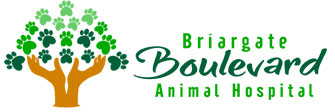When Sweets Aren’t So Sweet
One of the best things about the holiday season is the abundance of treats, especially sweets and chocolate. Unless you’re a dog or cat—for them, eating chocolate and other made-for-people goodies isn’t something to celebrate. Here’s why it’s important to keep the treats out of paw’s reach:
- Chocolate is high in fats, and contains theobromine and caffeine which affect the heart, central nervous system and urination frequency. This goes for white chocolate as well.
- The darker the chocolate, the more dangerous it is for our furry friends. Please be careful with baking chocolate, as this poses the biggest risk.
- If you suspect your pet has ingested chocolate, monitor for symptoms such as vomiting, diarrhea, excessive drinking, pacing, shaking or hyperactivity, and seek veterinary care immediately if any of these symptoms occur.
- Xylitol is a natural sweetener used in things like sugarless chewing gum, peanut butter, toothpaste, baked goods and many diet/sugar-free foods. Pets enjoy its sweet taste, but it is extremely toxic to them and can cause vomiting, loss of coordination, seizures, decreased blood sugar and fatal liver failure. The reason xylitol is so toxic for dogs is because, unlike in humans, it stimulates a rapid release of insulin from the pancreas, which may result in a drastic decrease in blood sugar levels known as hypoglycemia. It can occur within 10–60 minutes of ingestion and needs to be treated right away. While xylitol does not seem to be as dangerous for other pets, ferrets have been known to react similarly to dogs, with low blood sugar and seizures.
It can be difficult to keep an eye on everything your pet consumes, so it’s important that you’re attuned to your pet’s behavior. The moment you suspect they’ve ingested chocolate or xylitol, call our hospital at (719) 528-5557.
Anyone with pets should also keep the ASPCA Animal Poison Control Center number and website handy—it’s a valuable resource considering pets are well-known as consumers of things they shouldn’t have. The number is 888-426-4435.
